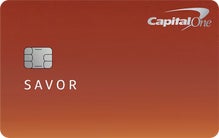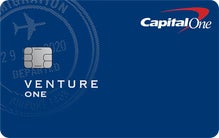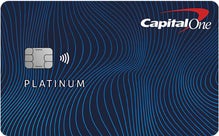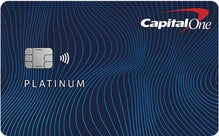Best Capital One credit cards of February 2026
Advertiser Disclosure: Bankrate’s editorial team chooses and recommends the credit cards on this page. Our websites may earn compensation when a customer clicks on a link, when an application is approved, or when an account is opened. However, our recommendations and card ratings are produced independently without influence by advertising partnerships with issuers.
Filter by
Showing 13 results
Best for premium travel benefits
on Capital One's secure site
See Rates & FeesIntro offer
Earn 75,000 bonus miles
Rewards rate
2 Miles - 10 Miles
Annual fee
$395
Regular APR
19.49% - 28.49% (Variable)
Why you'll like this: Its top-tier travel perks along with its elevated base rewards rate allow you to accumulate rewards faster and have a smooth travel experience.
Reward Details
What you should know
Card Details
Best for simplicity
on Capital One's secure site
See Rates & FeesIntro offer
Earn a one-time $200 cash bonus
Rewards rate
1.5% - 5%
Annual fee
$0
Regular APR
18.49% - 28.49% (Variable)
Why you'll like this: This card offers unlimited flat-rate cash back on every purchase without rotating categories or spending caps, making earning rewards easy and flexible.
Reward Details
What you should know
Card Details
Best for dining and entertainment
on Capital One's secure site
See Rates & FeesIntro offer
Earn a one-time $200 cash bonus
Rewards rate
1% - 8%
Annual fee
$0
Regular APR
18.49% - 28.49% (Variable)
Why you'll like this: The generous cash back rewards on dining, entertainment and grocery purchases make it ideal for event lovers and foodies.
Reward Details
What you should know
Card Details
Best for occasional travelers
on Capital One's secure site
See Rates & FeesIntro offer
Earn a bonus of 20,000 miles
Rewards rate
1.25X miles - 5X miles
Annual fee
$0
Regular APR
18.49% - 28.49% (Variable)
Why you'll like this: Having no annual fee makes it affordable for those who don't travel often and are looking for an inexpensive travel rewards card.
Reward Details
What you should know
Card Details
Limited time offer
$250 Capital One Travel Credit
Best for sign-up bonus
on Capital One's secure site
See Rates & FeesIntro offer
Enjoy a $250 travel credit & earn 75K bonus miles
Rewards rate
2X miles - 5X miles
Annual fee
$95
Regular APR
19.49% - 28.49% (Variable)
Why you'll like this: Now is the perfect time to apply thanks to its high-value sign-up bonus — one of the card’s best offers to date.
Reward Details
What you should know
Card Details
Best for business travel
on Capital One's secure site
See Rates & FeesIntro offer
Earn 50,000 miles
Rewards Rate
2X miles - 5X miles
Annual fee
$0 intro for first year; $95 after that
Regular APR
24.49% (Variable)
Why you'll like this: Business travelers seeking unrestricted travel rewards on their expenses will find this card a lucrative choice thanks to its unlimited flat-rate miles per dollar.
Reward Details
What you should know
Card Details
Best for small businesses
on Capital One's secure site
See Rates & FeesIntro offer
$2,000 cash back
Rewards Rate
2% - 5%
Annual fee
$150
Regular APR
N/A
Why you'll like this: Its unlimited cash back rate on all purchases can provide small businesses with a straightforward and valuable way to earn cash rewards on their expenses.
Reward Details
What you should know
Card Details
Best for people with limited credit history
Intro offer
N/A
Annual fee
$0
Regular APR
28.99% (Variable)
Why you'll like this: With responsible use, your credit limit can increase with this card, which makes it an effective tool for building credit.
What you should know
Card Details
Best for consumers with bad credit
Intro offer
N/A
Annual fee
$0
Regular APR
28.99% (Variable)
Why you'll like this: This card allows you to build or rebuild your credit history with a potentially low refundable deposit and a higher credit limit.
What you should know
Card Details
Best flat-rate cash back for students
Intro offer
Earn $50
Rewards Rate
1.5% - 5%
Annual fee
$0
Regular APR
18.49% - 28.49% (Variable)
Why you'll like this: The unlimited cash back rate on every purchase provides students with a terrific way to earn cash back rewards without sacrificing convenience.
Reward Details
What you should know
Card Details
Best overall for students
Intro offer
Earn $50
Rewards Rate
1% - 8%
Annual fee
$0
Regular APR
18.49% - 28.49% (Variable)
Why you'll like this: Students can earn boosted cash back on popular categories like dining, entertainment and groceries.
Reward Details
What you should know
Card Details
Best for fair credit
Intro offer
N/A
Rewards rate
1.5% - 5%
Annual fee
$39
Regular APR
28.99% (Variable)
Why you'll like this: For those with fair credit looking to earn cash back on their everyday spending, this card is a straightforward option.
Reward Details
What you should know
Card Details
Best secured card for flat-rate rewards
Intro offer
N/A
Rewards rate
1.5% - 5%
Annual fee
$0
Regular APR
28.99% (Variable)
Why you'll like this: You can prequalify before applying, which is beneficial for maintaining your credit score.
Reward Details
What you should know
Card Details
Remove a card to add another to compare
Remove a card to add another to compare
Compare our top picks for Capital One credit cards
| Card Name | Best for | Bankrate Review Score |
|---|---|---|
|
Simplicity |
3.8 / 5 Our writers, editors and industry experts score credit cards based on a variety of factors including card features, bonus offers and independent research. Credit card issuers have no say or influence on how we rate cards.
Apply now
on Capital One's secure site
|
|
|
Dining and entertainment |
5.0 / 5 Our writers, editors and industry experts score credit cards based on a variety of factors including card features, bonus offers and independent research. Credit card issuers have no say or influence on how we rate cards.
Apply now
on Capital One's secure site
|
|
|
Sign-up bonus |
5.0 / 5 Our writers, editors and industry experts score credit cards based on a variety of factors including card features, bonus offers and independent research. Credit card issuers have no say or influence on how we rate cards.
Apply now
on Capital One's secure site
|
|
|
Occasional travelers |
4.1 / 5 Our writers, editors and industry experts score credit cards based on a variety of factors including card features, bonus offers and independent research. Credit card issuers have no say or influence on how we rate cards.
Apply now
on Capital One's secure site
|
|
|
Premium travel benefits |
5.0 / 5 Our writers, editors and industry experts score credit cards based on a variety of factors including card features, bonus offers and independent research. Credit card issuers have no say or influence on how we rate cards.
Apply now
on Capital One's secure site
|
|
|
Business travel |
4.4 / 5 Our writers, editors and industry experts score credit cards based on a variety of factors including card features, bonus offers and independent research. Credit card issuers have no say or influence on how we rate cards.
Apply now
on Capital One's secure site
|
|
|
Small businesses |
4.7 / 5 Our writers, editors and industry experts score credit cards based on a variety of factors including card features, bonus offers and independent research. Credit card issuers have no say or influence on how we rate cards.
Apply now
on Capital One's secure site
|
|
|
Limited credit history |
4.2 / 5 Our writers, editors and industry experts score credit cards based on a variety of factors including card features, bonus offers and independent research. Credit card issuers have no say or influence on how we rate cards.
Apply now
on Capital One's secure site
|
|
|
Consumers with bad credit |
4.1 / 5 Our writers, editors and industry experts score credit cards based on a variety of factors including card features, bonus offers and independent research. Credit card issuers have no say or influence on how we rate cards.
Apply now
on Capital One's secure site
|
|
|
Student cash back |
4.6 / 5 Our writers, editors and industry experts score credit cards based on a variety of factors including card features, bonus offers and independent research. Credit card issuers have no say or influence on how we rate cards.
Apply now
on Capital One's secure site
|
|
|
Students |
4.6 / 5 Our writers, editors and industry experts score credit cards based on a variety of factors including card features, bonus offers and independent research. Credit card issuers have no say or influence on how we rate cards.
Apply now
on Capital One's secure site
|
|
|
Fair credit |
4.0 / 5 Our writers, editors and industry experts score credit cards based on a variety of factors including card features, bonus offers and independent research. Credit card issuers have no say or influence on how we rate cards.
Apply now
on Capital One's secure site
|
|
|
Secured card |
4.2 / 5 Our writers, editors and industry experts score credit cards based on a variety of factors including card features, bonus offers and independent research. Credit card issuers have no say or influence on how we rate cards.
Apply now
on Capital One's secure site
|
Types of Capital One credit cards
Capital One offers a variety of credit cards spanning multiple categories. Here are just a few types of credit cards you can find with Capital One.
Capital One credit card pros and cons
Pros
-
Credit card variety: Capital One has a long lineup of cards designed for a variety of spending habits. Capital One’s travel card qualification is especially competitive.
-
Wide credit score range: Whether you have bad credit or excellent credit, Capital One has a card designed to help you achieve your financial goals.
-
Numerous travel benefits: Capital One’s travel cards don’t charge foreign transaction fees and most come with solid perks useful for travelers.
-
Redemption: Cardholders have several redemption options, including cash back as a statement credit or check, purchases on Amazon.com and travel.
Cons
-
Annual fees: Many Capital One cards have an annual fee. However, some business cards waive the fee in the first year or can easily be offset.
-
Higher-than-average APR: Many Capital One cards have a relatively high ongoing APR, so cardholders should avoid carrying balances.
-
Few luxury options: Capital One only offers one high-end travel card, meaning competitors may offer more in terms of rewards and overall value.
Expert advice for Capital One credit cards
To give you more insight into how the best credit card for you changes throughout your credit journey, Ana Staples, CCC, Bankrate principal writer, shares her experience building credit with Capital One, upgrading her secured card and expanding her rewards card roster to travel with multiple issuers.
Cardholder Q&A: Ana Staples, CCC
Tips for choosing a Capital One card
Capital One boasts a versatile suite of cards, but no matter the type of card you can maximize your card in several ways and avoid common pitfalls.
-
Choose cash back or miles
If you don’t have many travel plans and just want to earn cash for your everyday spending, then stick with a cash back card. However, if you want to earn reward miles on an upcoming trip, then a travel card is your best option.
Unlike with competing cards, Capital One miles can’t be converted for cash back if you only have a single travel card (let alone at a 1-cent value apiece). -
Compare annual fees with perks and benefits
Some of Capital One’s best credit cards come with an annual fee. Typically, Capital One cards with higher annual fees will carry more lucrative perks. However, you should figure out if the cost of carrying the card justifies the added perks and if you’ll actually use them. Look for a card with practical perks that best suit your needs. If you don't spend enough to offset the costs, a no-annual-fee card can let you focus on earning rewards.
-
Check your credit score
Most of Capital One’s best credit cards require at least good credit. If your credit is poor, you might only qualify for a secured credit card or one of Capital One’s student credit cards.
-
Look at first-year offers
Capital One cards often come with welcome and intro APR offers that increase the card's first-year value. Welcome offers typically have a spending requirement that you must reach within a fixed timeframe, so you should choose a Capital One card with an offer you can attain without spending beyond your means.
A Capital One card with a zero percent intro APR offer on new purchases and balance transfers can help you save on interest if you need to consolidate credit card debt or manage a large purchase.
You can also see if you are pre-approved for certain Capital One cards without harming your credit score. While not all cards offer pre-approval, you can check for pre-approval for many popular Capital One cards. You can also use Bankrate's CardMatch™ tool to see if you match with a Capital One card. If you’re unsure if a Capital One credit card is right for you, check out our Credit Card Spender Type Tool. You can get personalized credit card recommendations based on your credit score, spending habits and daily needs.
How to maximize a Capital One card
Capital One boasts a versatile suite of cards, but no matter the type of card you can maximize your card in several ways and avoid common pitfalls.
-
Optimize your card's bonus categories and perks
Capital One cards like the Savor have tiered bonus categories, so make sure to optimize its rewards or cash back structure. A Capital One card that offers 3 percent cash back on dining should be used anytime you go out to eat, for instance. Or if you have a Capital One Lounge at your home airport, go to it when you travel. If you have multiple Capital One rewards cards, use the card that will get the most rewards or cash back from a particular purchase.
-
Explore your redemption options
Capital One rewards cards often have different ways you can redeem your points, miles or cash back. A cash back card might let you redeem for a gift card or you could apply your rewards directly to your account as a statement credit.
-
Consider point transfers
For travel cards, it's typically best to redeem miles for travel spending through the Capital One travel portal, but sometimes transferring your miles to an airline or hotel can get you a better deal. According to Bankrate's recent valuations, Capital One miles are worth about 1.7 cents per mile, so travel redemptions are generally more lucrative than non-travel options.
What credit score do you need for a Capital One card?
Capital One has plenty of great credit cards for people who want to earn rewards like cash back or travel points and miles. Its Savor and Venture X cards were top picks in the Bankrate Awards.
But what kind of credit do you need to increase your likelihood of approval?
According to our proprietary data, 46.5 percent of Bankrate users with excellent credit who applied for a Capital One card through our site in the last 12 months were approved. However, not having excellent credit doesn't mean you'll instantly be denied. Capital One has many products geared towards applicants with fair or thin credit. Of the Bankrate users who applied through our site in the last 12 months, 27.1 percent with fair credit were approved and 22.6 percent with thin credit were approved.
While our data suggests having excellent credit increases your chances of approval, there’s no guarantee, regardless of your credit score. To get a better sense of your chances of approval, keep an eye out for preapproval offers or use tools like CardMatch.
Frequently asked questions about Capital One credit cards
How we assess the best Capital One credit cards
When evaluating the best credit cards from Capital One, we take into account several factors, including how cards score in our proprietary card rating system and whether they offer features that fit the priorities of a diverse group of cardholders, from earning rewards to scoring a large sign-up bonus to saving on interest.
Our rating database covers over 250 of the most popular credit cards, allowing us to compare the quality of various Capital One cards to each other and to cards in the same category from other issuers. We scored each card based on the factors most relevant to its primary category, including its rewards rate, estimated annual earnings, intro APR period, ongoing APR, perks and more to determine whether it belonged in this month’s roundup.
Here’s a look at how our card ratings are distributed as of August 2024, as well as some of the key factors that we considered in selecting this month’s best Capital One cards.
-
5 stars 2%
-
4 - 4.9 stars 35%
-
3 - 3.9 stars 39%
-
2 - 2.9 stars 22%
-
1 - 1.9 stars 2%
Have more questions for our credit cards editors? Feel free to send us an email, find us on Facebook, or Tweet us @Bankrate.
*Automatically extends the original manufacturer's warranty on eligible purchases made with this card.
For Capital One products listed on this page, some of the benefits may be provided by Visa® or Mastercard® and may vary by product. See the respective Guide to Benefits for details, as terms and exclusions apply.


























